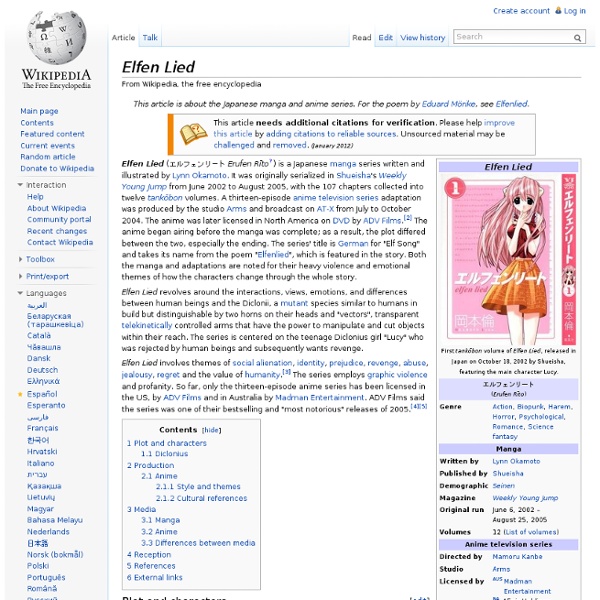Ghost in the Shell
Title[edit] Shirow has stated that he had always wanted the title of his manga to be "GHOST IN THE SHELL", even in Japan, but his original publishers preferred Kōkaku Kidōtai (攻殻機動隊?). He had chosen "Ghost in the Shell" in homage to Arthur Koestler's The Ghost in the Machine, from which he also drew inspiration.[1] Setting[edit] Primarily set in the mid-twenty-first century in the fictional Japanese city of Niihama, Niihama Prefecture (新浜県新浜市, Niihama-ken Niihama-shi?) In this post-cyberpunk iteration of a possible future, computer technology has advanced to the point that many members of the public possess cyberbrains, technology that allows them to interface their biological brain with various networks. Media[edit] Original manga[edit] Animated films[edit] Video games[edit] Live-action adaptation[edit] Stand Alone Complex[edit] In addition to the anime, there were published works on the series as well. The extensive score for the series and its films was composed by Yoko Kanno. Arise[edit]
Legend of the Galactic Heroes
Legend of the Galactic Heroes (銀河英雄伝説, Ginga Eiyū Densetsu?), also known as Gin'eiden (銀英伝?), is a series of science fiction novels written by Yoshiki Tanaka. In humanity's distant future, two interstellar states - the monarchic Galactic Empire and the democratic Free Planets Alliance - are embroiled in a never-ending war. The story focuses on the exploits of rivals Reinhard von Müsel and Yang Wen Li as they rise to power and fame in the Galactic Empire and the Free Planets Alliance. Plot[edit] An advertisement for the movie Legend of the Galactic Heroes: Overture to a New War (1993) which shows the main characters. The story is staged in the distant future within our own Milky Way Galaxy, approximately in the late 36th century. Within the Galactic Empire, based on mid 19th century Prussia, an ambitious military genius, Reinhard von Müsel, is rising to power. In the Free Planets Alliance Star Fleet is another genius, Yang Wen Li. Novels[edit] Adaptations[edit] Original Video Animation[edit]
Profit (TV series)
Jim Profit is a newly promoted junior-executive at Gracen & Gracen (G&G), a multinational conglomerate that often engages in unethical business practices, while actively cultivating a positive public image. G&G’s dark side does not bother Profit, who is not above using blackmail, bribery, extortion, or worse to get ahead, himself. Jim Profit addresses the audience via voiceover narration, and occasionally even “breaks the fourth wall” by speaking directly to the camera/audience with such quotes as: "The line most people say they won't cross… it's usually something they've already done, when they thought no one was watching." Jim Profit (Adrian Pasdar) – born James "Jimmy" Stakowski, he was raised in a cardboard, G&G shipping box (with a hole cut out for him to view a constantly-on television) by a neglectful, physically and psychologically abusive father in a rural area near Tulsa, Oklahoma. In the UK the entire run was originally screened on Sky 2 in 1996, and later on BBC2.
Mobile Suit Gundam 00
It is directed by Seiji Mizushima and written by Yōsuke Kuroda, and features character designs by Yun Kōga. The 25-episode season was officially announced by Sunrise during a 15-second trailer on June 2, 2007.[1][2][3] The series aired on the Mainichi Broadcasting System and Tokyo Broadcasting System from October 5, 2007 to March 29, 2008. The second season began on October 5, 2008 and concluded on March 29, 2009. Plot[edit] Season 1[edit] The series is set in 2307 AD.[6] As a result of the depletion of fossil fuels, humanity had to search for a new source of power. Unable to counter Celestial Being's superior technology, the three major powers eventually unite into the United Nations Army in order to counter Celestial Being's armed interventions.[10] In order to fight the Gundams, the United Nations Army employed the help of Laguna Harvey. Season 2[edit] Four years have passed since the final battle between Celestial Being and the UN Forces. Production[edit] Development[edit] Release[edit]
Cheeky Angel
Story[edit] At the age of nine, Megumi is an aggressive always fighting boy. One day he saves a strange man from a gang of other children. In return, Megumi receives a magical book. After accidentally bleeding on the book, a genie named Pierrot appears and offers to grant him a wish. Megumi wishes to become a strong man's man. Publications[edit] Currently, Cheeky Angel manga is translated and published in English by VIZ MEDIA, with 20 volumes at the present time. Characters[edit] Megumi Amatsuka Voiced by: Megumi Hayashibara While Megumi is physically a very attractive female, she still retains her masculine mannerisms and fighting abilities, which she uses very often, attracting the 'Megu-chan Protection Club', a group of misfit admirers. Miki Hanakain Voiced by: Makiko Ohmoto Miki is Megumi's childhood friend and would do anything to help her. Keiko Tanaka Voiced by: Naoko Matsui A spoiled brat and Megumi's rival. Megumi's father (aka Megu-papa) Voiced by: Banjou Ginga Tsubasa Amatsuka Yoriko



